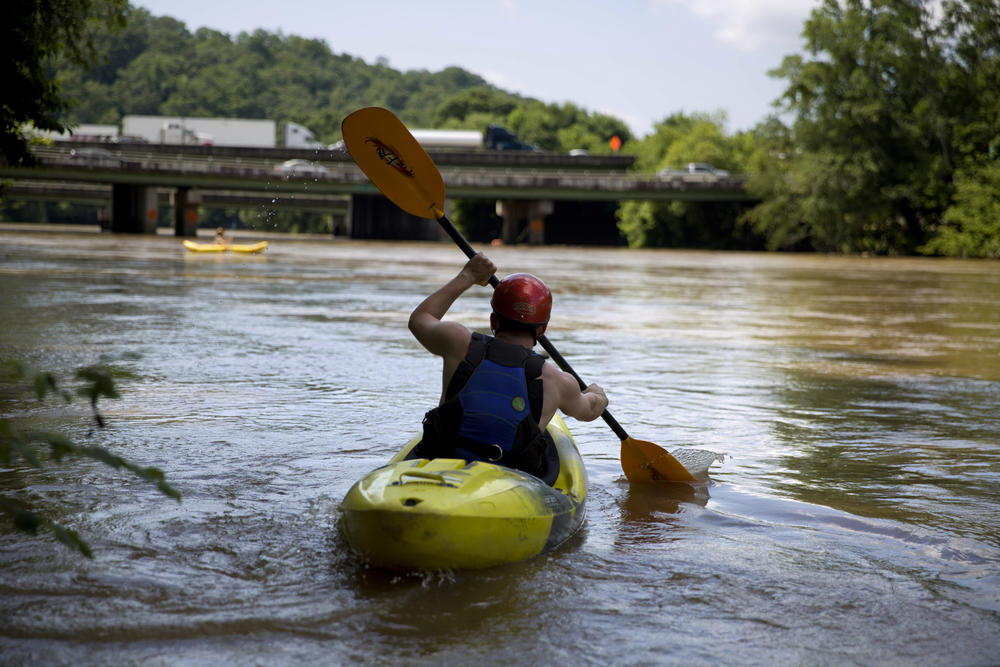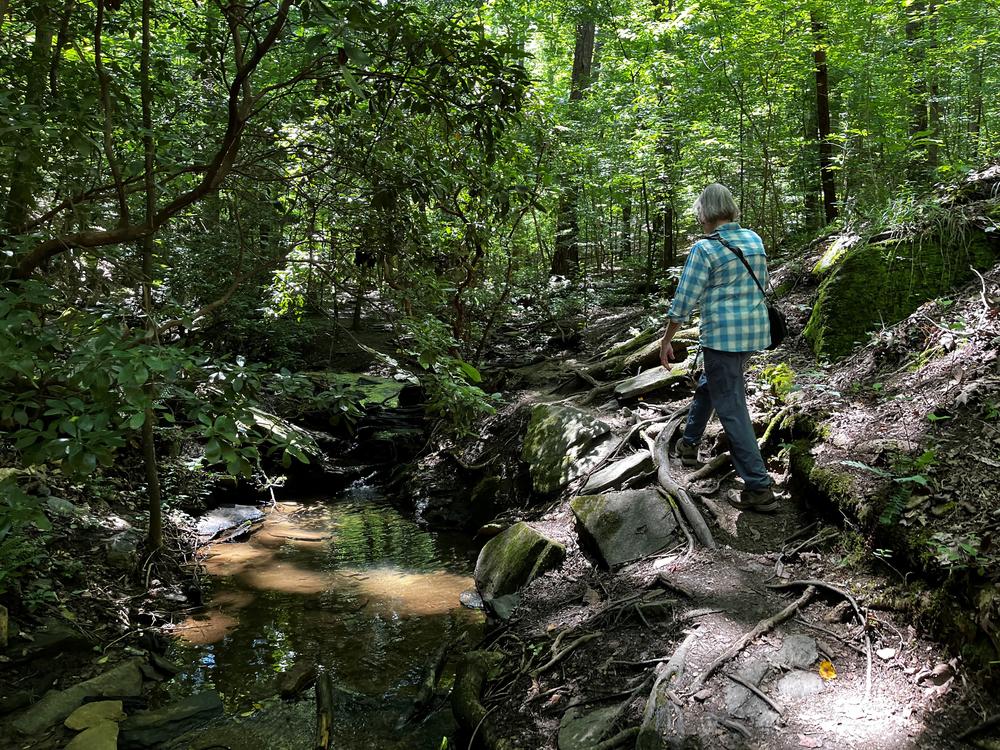
Section Branding
Header Content
Georgia Today: Kia facility expansion; Rise in guns at airports; Chattahoochee River health
Primary Content
LISTEN: On the Wednesday, July 12 edition of Georgia Today: South Korean automaker Kia announces plans to expand its manufacturing facility in West Point; airport security officials have detected a rise in guns at Georgia airports; and a retired riverkeeper reflects on the health of the Chattahoochee.

Peter Biello: Welcome to the Georgia Today podcast from GPB News. Today is Wednesday, July 12th. I'm Peter Biello. On today's episode, South Korean auto manufacturer Kia announces plans to expand its manufacturing facility in West Point. Airport security officials have detected a rise in guns at Georgia airports. And a retired riverkeeper reflects on the health of the Chattahoochee. These stories and more are coming up on this edition of Georgia Today.
Story 1:
Peter Biello: An Atlanta-based pharmaceutical company, has received approval from the Food and Drug Administration for a new medication to treat people with a rare autoimmune disease. GPB's Ellen Eldridge has more.
Ellen Eldridge: UCB's new drug Rystiggo will treat myasthenia gravis. The autoimmune disorder typically strikes young women and men over the age of 50. There are two subsets of the disease, and up until now, only one type could be treated. This drug will treat both. Kim Moran is with UCB. She says the most noticeable symptoms are eyelid drooping and blurred vision.
Kim Moran: But really, the biggest symptoms are neuromuscular, so they're muscle weakness. And in some it can affect them very profoundly in which they have respiratory depression and basically have trouble breathing.
Ellen Eldridge: Patients in the clinical trials showed improvements in several ways, including breathing, speaking and walking. For GPB News, I'm Ellen Eldridge.
Story 2:
Peter Biello: Christine King Farris, the last living sibling of the late Rev. Dr. Martin Luther King Jr, will lie in state at the Capitol. King died June 29. She was 95 years old. This week, several celebrations of her life are taking place in Atlanta. Farris will be just the fourth African-American to lie in state at the Capitol. The King Center says it will happen on Friday from 11 a.m. until 7 p.m.. A funeral takes place on Sunday evening at Ebenezer Baptist Church in Atlanta.

Story 3:
Peter Biello: Airport security officials are detecting more guns at Georgia airports. The Transportation Security Administration said today that for the six months ending in June, agents at six Georgia airports discovered more than 226 firearms in travelers' carry-on luggage. That's eight more than last year and in line with national trends. Agency spokesman Mark Howell says there are just more people traveling and more people with guns.
Mark Howell: In states where we have open carry, concealed carry or permitless carry, it becomes kind of a day to day routine to have your firearm with you. But you really have to flip the switch if you're traveling.
Peter Biello: He adds, traveling with a weapon brings potential criminal citations and possible fines of up to $15,000.
Story 4:
Peter Biello: South Korean automaker Kia plans to invest more than $200 million and create nearly 200 new jobs at its manufacturing facility in West Point. The numbers from Gov. Brian Kemp's office today come three months after the company announced it would produce its new electric SUV at the plant, making it the fifth Kia model to be assembled there. Production of the vehicle, the EV9, is expected to begin next year.
Story 5:
Peter Biello: Business leaders in Southeast Georgia's Glynn County will host a job fair tomorrow and Friday for laid-off employees of the chemical processing plant Pinova. GPB's Benjamin Payne reports.

Benjamin Payne: The event comes three months after a massive fire broke out at Pinova's resin factory in Brunswick. No one was killed, but major structural damage led the company to begin closing the plant permanently. Now, more than 200 people are out of work, but this week some could find new employers when 40 companies set up booths for a job fair at Pinova's Brunswick headquarters. McKenzie Padgett is with the Golden Isles Development Authority, which is helping organize the event.
McKenzie Padgett: A lot of these skills that these individuals have are transferable to most industries, so I really don't think there be any issues with them locating in a great career that is able to pay as much if not more than their past career.
Benjamin Payne: The job fair takes place Thursday afternoon and Friday morning, and it's only open to laid-off Pinova workers and current employees of the company. For GPB News, I'm Benjamin Payne.
Story 6:
Peter Biello: Columbus-based insurance giant AFLAC is taking over title sponsorship of the kickoff game that starts the college football season. Peach Bowl officials said today that the company has agreed to a three-year partnership with the game, now formerly known as the Chick-Fil-A Kickoff Game. Atlanta-based fast food giant Chick-Fil-A will continue as the title sponsor of the Peach Bowl. This year's kickoff game will feature the Atlantic Coast Conference opener between Louisville and Georgia Tech on Sept. 1.
Story 7:
Peter Biello: The Chattahoochee River is an essential part of the state's ecosystem. Running from the north Georgia mountains all the way to Florida and the Gulf of Mexico, its river basin straddles three states and sustains more than 5 million people in the metro Atlanta area alone. It's also sensitive to drought and vulnerable to contamination. River keepers have been fighting for decades to maintain its health and push for policies that protect it. Sally Bethea served as River Keeper for two decades before she retired in 2014, and her new book, Keeping the Chattahoochee is part love letter to the river, part call to action for those who want to protect it. Recently, she spoke with me about her work at the banks of the Chattahoochee River.
Sally Bethea: Today, the river is fairly, fairly low because you can see all the rocks poking out. The river itself, where the fast moving water is in the middle there. I mean, that's the center of the flow. And you see some ducks enjoying the sunshine and the water, clean water. So fabulous.
Peter Biello: The only perspective I've had on the river so far has been driving over it on the highways.
Sally Bethea: Most people look down — "oh, there's the river" and it's either like, "Oh, it looks good today" or "Ooh, it's muddy" because it rained. One thing in the book and in all of riverkeepers' work that we've focused on is emphasizing the connectivity and helping people think about [and] visualize where the river starts on this little, tiny spring and how it travels 546 miles down to the Gulf of Mexico [and] ends up with a different name, the Apalachicola. But it's the same water.
Peter Biello: You wrote this book to help people understand the river. I wanted to ask you to explain why it's important to understand it, especially if someone never sees it, except when they're driving over it on the highway. Or maybe if they live miles and miles away from it. Why is it important to understand the river?
Sally Bethea: Rivers are essential to our lives in so many ways, as we know that each one of us is 60% water. And this river here sustains 5 million people, at least, with drinking water and so much more. So there's the aspect of self-interest. You know, where does my water come from? And I wanted to write a book that helps explain that.
Peter Biello: You write in this book about the watershed for the metro Atlanta area. I'm not going to get the wording exactly right, but it was something about it being relatively small for the size of the metro area. And I'm wondering if that's alarming to you? So many people depending on a relatively small watershed when compared to other cities.
Sally Bethea: I do worry about the fact that we have such a small watershed, and we have a metropolitan area focused like laser on keeping as much water in Lake Lanier upstream to allow Atlanta intakes to function during droughts. That's when the problem is, during droughts. But I wonder about all the communities, people and ecosystem downstream. You know, we've got to figure out a way to share, to equitably share this river. Given the geography, the geology that we have, it's what we've got. And so working together is key. And that's tough when it comes down, particularly, to moneyed interests.

Peter Biello: The second part of that question had to do with growth and the growth in the Atlanta area. The population here is expected to increase quite a bit. Is the Chattahoochee watershed prepared for that? And if not, I mean, what happens to communities downstream, Columbus, you know, all the way down to Florida?
Sally Bethea: We, in the recent years, we've had a lot of rain and people seem to forget what it was like back in 2006 to 2009 when we had an exceptional drought. That will happen again. Now, many decision makers, leaders at all levels have tried to put together some plans to better deal with that eventuality, but they have still not come to a result, an outcome that I think will ensure everyone up and downstream is adequately protected, including the river itself. A lot of partisanship — of course, this river basin straddles three states. So you've got fights — Alabama, you've got Georgia, you've got Florida. And we have the capacity to be more careful with our water and more thoughtful. And I'm seeing metro leaders slipping back on some of the really good measures they made in the last, let's say, 10 to 12 years. There's a complacency again. You know, you've got a drought, people work to preserve, protect the water. And then you've got a lot of water? People forget about it.
Peter Biello: We heard recently about a bacterial contamination in the Chattahoochee. And anyone who reads your book will learn that this is far from the first time something has contaminated the water. There have been sewage spills, untreated wastewater. You write about witnessing a spill yourself. What does it take to heal a river when something like that happens? Is it all human intervention? Does the river to some extent heal itself over time? What happens in the healing process?

Sally Bethea: Rivers are amazingly resilient if you don't overuse and abuse them too much. If you're looking at bacterial pollution, untreated sewage going into a river, that bacteria will die within three or four days. It's looking for warm-bodied mammals to live in, and cold rivers are not where the bacteria like to live. So you stop the sewage spill and, you know, the river is going to take care of that. What we've seen recently was an ongoing — a chronic problem with Fulton County's Big Creek sewage plant. They're still trying to figure out what happened there. So with bacterial contamination, you stop the source. The river can, for the most part, heal itself. When you're talking about toxic chemicals, things even like DDT and chlordane, which have been banned for decades and decades, they're still persisting in the fish tissue, in some of the fish in this river. You can't just magically clean things like that up.
Peter Biello: So is there a concern that this river may get something dumped in it that just makes it beyond healing for human use?
Sally Bethea: No, that's not going to happen to the Chattahoochee River, I don't think. We're not going to let that happen.
Peter Biello: You're retired as riverkeeper in 2014. You've been an informal adviser to your colleagues who are still caring for the river since then. You've been writing. You've got this book out. Is there any one thing in your career that you feel has made the biggest impact on the health of this river?
Sally Bethea: You know, I mean, I think the biggest impact on the river and it's not just me, but it's the small group of people who started the organization Chattahoochee Riverkeeper. I feel like the growth of that organization, the fact that it is still thriving to this day, it is still helping speak truth to power, monitor the river, helping people enjoy the beauty of the river. And we're just one riverkeeper or river organization. But in my life, for this river, I think creating and help sustaining that organization is what I look back on as my biggest impact.
Peter Biello: Well, Sally Bethea, the book is Keeping the Chattahoochee. Thank you so much for taking me to the river. And thanks for speaking with me.
Sally Bethea: Thank you so much. I really appreciate it.
Story 8:
Peter Biello: Russian tennis player Daniil Medvedev has ended Atlanta native Christopher Eubanks' fairy tale run at Wimbledon. The Russian defeated the former Georgia Tech player today in five sets. Despite his loss today, his run at Wimbledon has been impressive and inspiring. The 27-year-old was listed as a two-time all-American during his three seasons at Georgia Tech before rising through the ranks to become the last American standing at the Wimbledon championship. GPB's Orlando Montoya spoke with his college coach, Kenny Thorn, before today's game.
Orlando Montoya: You coached Chris for three seasons at Georgia Tech. You also recruited him right out of high school, but he wasn't a top-ranked junior player. What did you see in him?
Kenny Thorne: Well, besides being 6 foot 7 and a huge serve and a huge forehand, not a lot. He had — he actually had a lot of skills. He just hadn't put them together at the time in junior tennis.
Orlando Montoya: What was his turn around like? Did you witness his turnaround then?
Kenny Thorn: Kenny Thorne: Well, he came — he did come into the college and he, he was able to — I feel like college really puts a lot of pressure on you. You're in a team environment, where in junior tennis, it's kind of just about yourself. And so you — when you help the team win, there's that extra pressure. And he loved the big stage. He really enjoyed having pressure on him. And he was one of those guys that kind of rose to the occasion when pressure was on and he rose through the ranks of our lineup and played No. 1 by the end of his freshman year and really embraced college tennis. But now I think he's just settling to his identity on the court that much more. And we're kind of seeing — seeing the fruits of all his work right now. He is not just a very good tennis player. He is a very good person. We at Georgia Tech, we would go and do a lot of community service projects. And, you know, sometimes you're taking guys in college and taking them out because they're supposed to go out and serve the community and trying to teach them, you know, what it means to give back. And he was the first one there and the last one to leave. And you never had to tutor him on any of the giving back part.

Orlando Montoya: Well, you must be proud of — of your role, or at least Georgia Tech's role.
Kenny Thorn: Yeah, well, Georgia Tech was great to Chris. He loved Georgia Tech. He still loves it. He trains out of Georgia Tech. And yeah, I think everybody's behind him. He's been supporting Georgia Tech for a while. And so Georgia Tech is definitely going to support him.
Peter Biello: That was GPB's Orlando Montoya speaking with Georgia Tech tennis coach Kenny Thorn. You can watch Christopher Eubanks compete in the Atlanta Open beginning a week from Saturday at Atlantic Station.
Peter Biello: In other sports news, at the All-Star Game last night, the National League snapped a losing streak that lasted more than a decade and beat the American League 3 to 2. Highlights from the game include Braves third baseman Austin Riley snagging a line drive and throwing it from his knees to first for a double play. Truist Park is under consideration for the 2025 All-Star Game. Commissioner Rob Manfred told the Baseball Writers Association of America yesterday that Atlanta's in the mix, but he isn't prepared to go past that right now. The Texas Rangers are due to host next year. Also under consideration for upcoming All-Star Games is Chicago's Wrigley Field, which hasn't hosted the All-Star Game since 1990. The 2021 All-Star Game was awarded to Atlanta's Truist Park by Major League Baseball in 2019. But in April 2021, it was moved to Denver, following objections to sweeping changes to Georgia's voting laws. The Braves begin a three-game homestand against the Chicago White Sox on Friday night.
And that's it for this edition of Georgia Today. Thank you very much for tuning in. If you want to learn more about any of these stories or check out photos from my visit to the Chattahoochee River, visit GPB.org/news. If you haven't yet hit subscribe on this podcast, take a moment and do it right now. That way we will be there in your podcast feed, waiting for you tomorrow afternoon. And if you've got feedback, we'd love to hear it. Email us. The address is GeorgiaToday@GPB.org Story ideas are welcome as well. Again, GeorgiaToday@GPB.org. I'm Peter Biello. Thanks again for listening. We'll see you tomorrow.
---
For more on these stories and more, go to GPB.org/news



